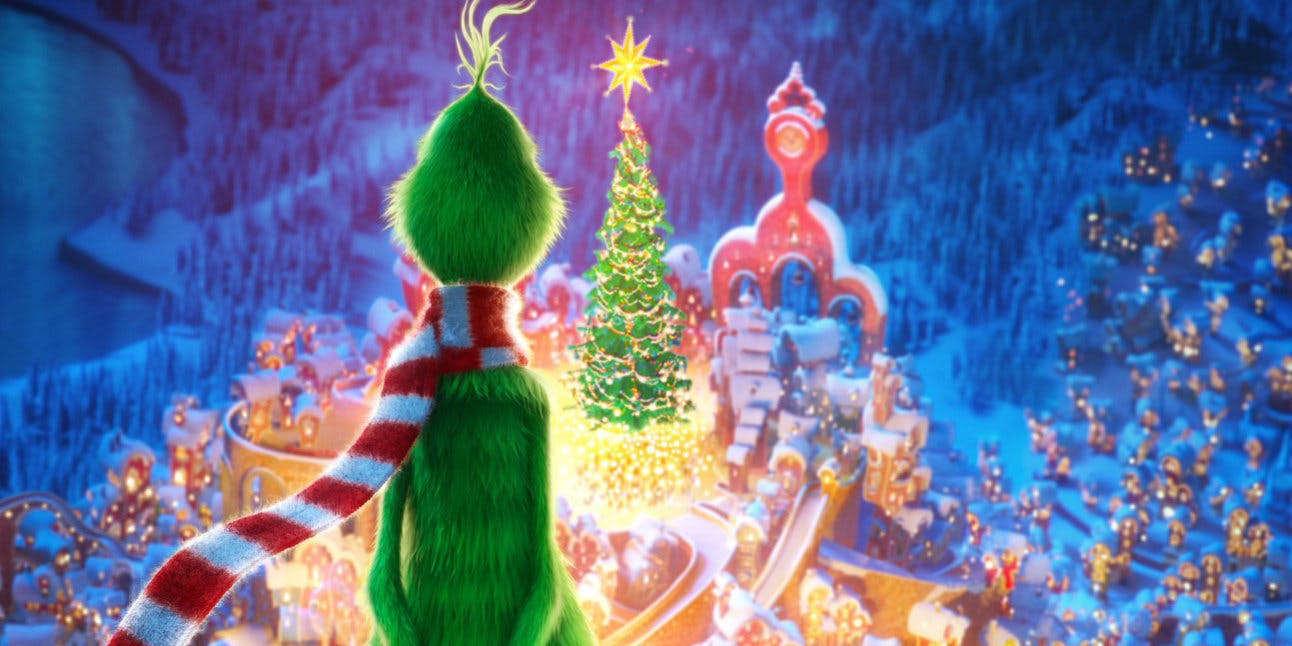Dr. Seuss’ How the Grinch Stole Christmas is far and away one of the celebrated childrens’ author’s most beloved stories. That story was also turned into an equally brilliant 1966 animated TV special, which remains a frequent Holiday tradition for many people to this day, including something that’s shared with their children. That was where things remained for many years, until Universal took a live-action crack at the story with 2000’s feature film adaptation that starred Jim Carrey as the titular Grinch, released under the same name as Dr. Seuss’ original book (though it is more simply dubbed ‘The Grinch’ in some territories and releases), which drew mixed reception from most critics, but has since gained a cult following of fans. 2000’s live-action How the Grinch Stole Christmas has thus also become a classic Christmas movie in its own right, albeit one that audiences don’t tend to always agree on, which has stood the test of time thanks to a widely adored lead performance from Jim Carrey, who managed to defy a rather heavy (but fantastic) makeup job to help win the movie an Academy Award for Best Makeup, back when it was new.
You’d think that’s where things would end. Universal got their cult favourite Dr. Seuss adaptation, perhaps the best thing to come from Hollywood’s repeatedly problematic attempts to adapt Dr. Seuss stories into feature films, and certainly Universal’s, after they would go on to follow up their live-action take on How the Grinch Stole Christmas with a horrendous live-action adaptation of The Cat in the Hat in 2003, which was so bad that it pretty much single-handedly killed Universal’s interest in any future Dr. Seuss adaptations (Horton Hears a Who! would get an animated Hollywood movie a few years later, though this one was handled by 20th Century Fox), at least until they went on to acquire their very own animation studio, Illumination (this was before they would also go on to acquire Dreamworks Animation). After buying out Illumination, Universal saw a renewed opportunity to take another stab at making Dr. Seuss movies, this time in animated CG form, and thus they quickly secured a deal that would see Universal and Illumination re-acquiring the rights to Dr. Seuss’ stories. The first byproduct of this deal was 2012’s first-ever feature film adaptation of The Lorax, which was a strong box office hit, despite also drawing mixed reception from critics and moviegoers.
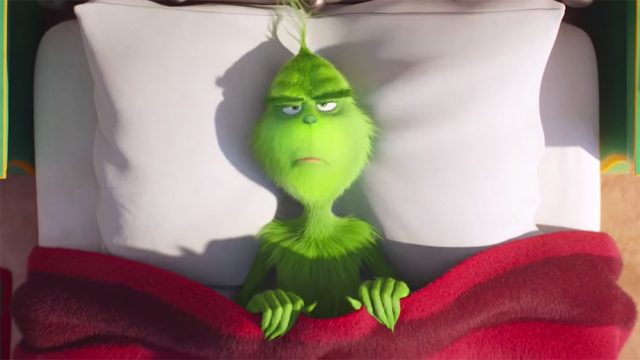
Now that Universal and Illumination have proved their vision for Dr. Seuss movies, at least commercially, with the debuting feature adaptation effort for The Lorax over six years ago, they’re going back to touch up the Holiday favourite that they already adapted in live-action form, with Illumination’s The Grinch (and sure enough, Illumination is also following this up with a CG feature rendition of The Cat in the Hat, go figure). Now with Benedict Cumberbatch voicing the character, free of the burden placed by Jim Carrey’s hefty makeup, The Grinch re-adapts the adaptation that Universal delivered before, attempting to address some of the criticisms from both the live-action How the Grinch Stole Christmas as well as Illumination’s The Lorax, at least as far as Illumination’s modest priorities tend to go as an animation studio.
To the credit of The Grinch, it is indeed a more agreeable adaptation of the source material as well, doing away with some of the more biting elements of the live-action movie, and leaning a bit further into the style of the original book. The modest 86-minute runtime also prevents this new adaptation from overstaying its welcome, keeping the small scale of the story, even if it still often feels like it has to stretch itself to hit a feature-length scale. It’s all-in-all a fine movie, with ‘fine’ movies being what Illumination seems to mostly deliver up to this point, though in taking away the more controversial elements of the live-action movie, The Grinch also ended up sucking out everything that was distinct about the former Hollywood adaptation of this timeless story. The Grinch does its job, having enough humour and colourful visuals to entertain while it lasts, but it’s also far more disposable and far less memorable than the previous live-action movie, let alone the original Dr. Seuss book and its TV special. It’s worth checking out with your kids, or just on your own if you happen to like animated movies, but The Grinch definitely works better as a passing curiosity, rather than the next enduring audience staple for the Christmas season.
Benedict Cumberbatch is definitely stretching his chops quite a bit as the Grinch, not only once again having to shed his trademark British accent (something that he also did for the Marvel Cinematic Universe during his appearances as Doctor Strange), but also play up his famously low, booming voice to make it much higher and more energetic. Cumberbatch practically sounds unrecognizable in this role, but he throws himself into the job with commendable gusto, bringing a lot of life and character to his take on the Grinch. This will definitely entertain children in particular, but it also further draws attention to what ends up being the greatest weakness of this new animated Grinch movie; It completely lacks any sense of bite or real tension. Even the original Dr. Seuss story had some sinister elements that created a good air of child-friendly suspense. In this case though, even the Grinch himself feels too kooky and docile, despite Cumberbatch’s best efforts to still portray him as an eccentric grump.
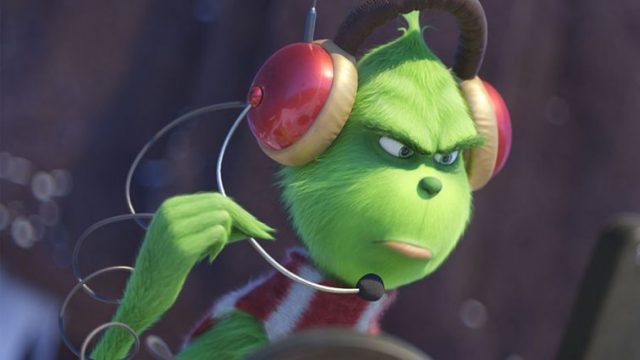
Much of the time, this comes down to the script, which is so lightweight that it feels like it’s practically going to blow out of the actors’ hands while they’re trying to read off of it. Breezy is definitely the word for The Grinch too, a movie that is so aggressively un-challenging that it ends up portraying personalities that are frustratingly bland. Even the Grinch himself ends up being something of a nice guy in many scenes, and it’s tough to discuss why without spoilers, but you’ll know why this Grinch lacks edge when you see it in action. Carrey’s Grinch from the live-action movie was definitely more believable as a mentally eroding sociopath, a personality that you would believably accept would try to ‘steal’ an entire Holiday. Cumberbatch’s Grinch meanwhile never really manages to deliver a compelling reason for why he wants Christmas to go away. The movie tries to make a half-hearted explanation, but it only ends up lifting a less developed and less inspired version of the same backstory from the live-action movie. Frankly, it worked a lot better there, even if the awkward ‘Grinch crush’ angle with Martha May is thankfully gone, along with that entire character, in this animated adaptation.
Things aren’t much better with the Who’s. There’s just not that much to say about them in this case. Rashida Jones does what she can as the perpetually busy, put-upon mother of Cindy-Lou Who, the main specific Who presence from the original story (and the child lead from the live-action movie), but she ultimately just ends up being a cliche. Cindy-Lou herself, voiced here by child actress, Cameron Seely, has a bit more charm, and manages to be the character that stands out most in many cases, due to her adventurous spirit and surprisingly selfless Christmas wishes, but her story arc doesn’t manage to connect to The Grinch as effectively as it did in the live-action movie. Cindy-Lou just ultimately feels like she’s around to hammer in the movie’s simple-minded message at the end, which feels like a dis-service to the movie’s most interesting character, at least on paper. Everything in The Grinch has clearly been focus-tested to death, in a desperate bid to avoid any of the contested or uncomfortable scenes that were in the live-action movie. Like I said however, this just strips away the identities of the characters to the point of even making the Grinch himself disappointingly bland.
The Grinch follows pretty much the exact story template that you would expect. A grumpy Grinch dislikes Christmas, an occasion that the local town of Whoville is particularly passionate about, and eventually, the Grinch becomes so annoyed with the Whoville community that he decides to ‘steal’ Christmas, masquerading as Santa Claus on Christmas Eve night to try and snatch the presents and decorations of the entire town. Then there’s the big moral lesson, and his heart grew three sizes that day, and yes, chances are, you know this story like the back of your hand. Beyond a few added scenes for the sake of jokes and exploring the Grinch’s backstory, which mostly exist to pad out the runtime, there aren’t many instances where the movie deviates from this source story, perhaps to the relief of some Dr. Seuss purists.
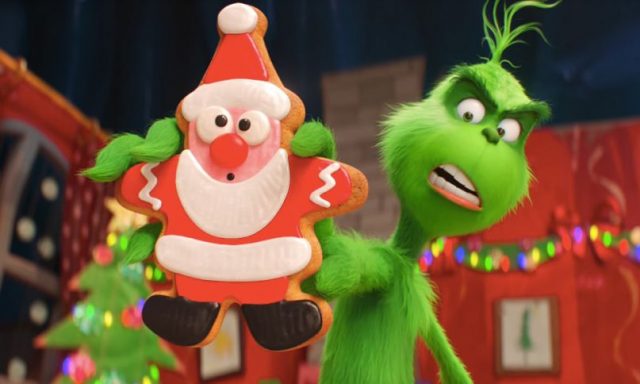
Again though, the live-action movie may be filled with scenes that didn’t work, or were just presented awkwardly and uncomfortably in the end, but at least it took risks. At least it tried to carve out its own weird niche, and it succeeded, considering the movie’s persistent cult following that has endured to this day. Illumination’s take on this story, meanwhile, plays it way too safe, and it becomes completely forgettable as a result. There are good jokes here and there, but most of The Grinch will fall out of your head by the time you leave the theatre. If anything, the story of this animated adaptation will simply motivate you to revisit the book, the TV special, or indeed Universal’s previous live-action adaptation, all of which were more impactful and more ambitious tellings of this story.
The Grinch is co-directed by Scott Mosier, a former producer for Kevin Smith movies (yes, seriously), who is making his feature directing debut here, and Yarrow Cheney, one of the co-directors from Illumination’s own The Secret Life of Pets. There’s not a lot to say about their direction either. Cheney injects some of the same high-energy charm that The Secret Life of Pets managed to deliver during this movie’s better moments, but beyond that, The Grinch just feels very workmanlike with its execution. It’s hitting all of the same beats that viewers would expect from the original story, and more or less serves as a mentally numbing adaptation that your brain will struggle to retain for any real length of time. I suppose it’s true that the movie won’t offend you, since it’s so middling that it wouldn’t even know how, but this further begs the question of why it even needs to exist, if there doesn’t appear to be any clear inspiration behind it beyond re-adapting How the Grinch Stole Christmas for its own sake.
Danny Elfman composes the soundtrack to The Grinch, although you’d never know this from listening to it, since most of Elfman’s signature touch seems to be absent from this movie’s score. Instead, The Grinch’s music seems just as disinterested as its writing and direction, doing the bare minimum to work as a kid-friendly animated score, and nothing else. This seems to be work-for-hire even for Danny Elfman, who has composed some of the most memorable and whimsical scores in the history of entertainment. Why even bother springing for Danny Elfman if you’re not even going to properly use him? A true Danny Elfman score would actually be kind of welcome here, since it would at least inject something extra fun and memorable to latch on to, but it seems like even Elfman couldn’t be bothered to do this, after trying to work with a movie that feels like it’s not even trying to stand out in any way. The most distinct thing about the soundtrack is the remix of, “You’re a Mean One, Mr. Grinch” by Tyler, the Creator, which is kind of fun at first, but its appeal quickly wears off, degrading into something that’s just as run-of-the-mill as the rest of the score.
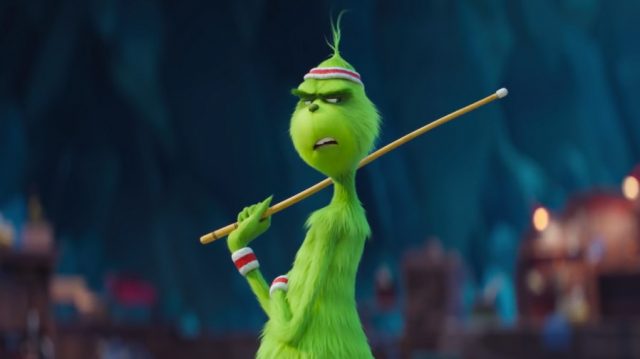
There’s not really anything to say about the rest of the audio work either. It’s all pretty fluffy, kid-friendly fare, even during the supposedly more tense scenes, such as the climax, when the Grinch inevitably gets to learn the big moral lesson. Even during the most fast-paced, energetic scenes, usually spearheaded by Cindy-Lou, The Grinch’s audio feels almost too toned down, save for a handful of more pronounced audio-driven gags, such as that, “Loud snow” bit from the trailer. Again, the sound mixing and audio design is fine, it’s all fine, but there’s really nothing to say about it. It does exactly what you think a modern animated kids’ movie is going to deliver in its sound design, and that’s all. It’s all fine, never exemplary, and to undemanding family audiences, I suppose that’s fair enough.
The Grinch’s animation hovers around the usual middle-tier standard that Illumination is often content to settle for, even if the studio did look like it was going to at least try and bump that up a tad with 2016’s Sing. Despite Sing trying a bit harder to elevate the animation however, Illumination has gone right back to their frustrating ‘cheap’ look in The Grinch, which relies on basic, cost-cutting models for both the characters and environments quite a lot. The colour scheme is at least good, and the movie certainly isn’t bad to look at, but like everything else, there’s nothing special about the visuals. They just kind of hang there, all too happy to be dwarfed by superior animation outfits like Disney/Pixar and Dreamworks Animation. The ‘dirty’ look from the live-action adaptation is at least gone in the rather vibrant and glossy environments of The Grinch, but even the original TV special managed to pop out more all the way back in 1966, and that’s before considering the excellent illustrations in the original Dr. Seuss book too!
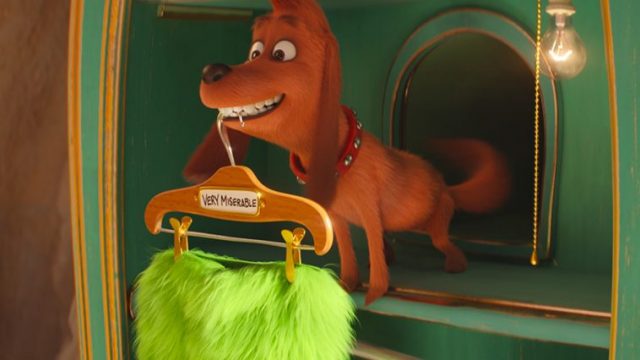
As for the 3D, well, you know the drill by now. It’s fine. It’s satisfactory. You might as well see The Grinch in 3D because you will at least get more out of the visuals that way, thanks to a few more eye-popping 3D effects, and a general air of heightened atmosphere throughout Whoville especially. Even by Illumination’s standards however, the 3D presentation in The Grinch just feels too middling and unimpressive, and is actually considerably beneath the studio’s usual 3D work. Say what you will about Illumination’s aggressive cost-slashing throughout their animation, but at least the studio has done a pretty good job with most of their 3D presentations, something that isn’t always consistently replicated in The Grinch. You definitely see a downgrade when you watch the movie flat in 2D, but not enough to make a decisive difference. I really wish that The Grinch had committed to filling itself out with more distinct 3D effects, since the 3D that we do get can’t seem to muster up any more enthusiasm for the production than most anything else, aside from the actors anyway.
The Grinch ultimately avoids the controversy that 2000’s live-action adaptation of this story sometimes courts, plus it does admittedly excise a few of the problems with 2012’s feature adaptation of The Lorax, namely its miscast leads and awful pop musical numbers. Ultimately though, The Grinch ends up trying too hard to avoid audience displeasure, and that makes it very boilerplate and milquetoast as both an animated movie and a Dr. Seuss adaptation, fading from your memory even as you’re watching it. The voice actors certainly try their best to inject some much-needed charm and quirkiness into the movie, but if The Grinch is good for any one thing, it’s simply helping you appreciate the previous adaptations of this story, and of course its original source, the much-beloved Dr. Seuss book, How the Grinch Stole Christmas.
That’s not to say that The Grinch is bad, since it’s quite acceptable as far as Illumination movies go, and animated family movies in general for that matter. The live-action adaptation that Universal delivered before still ends up feeling like the superior experience though, because, for all of its botched moments and weird design decisions, at least it was trying to challenge the viewer in some way, while also courageously embracing its own eccentric take on Dr. Seuss’ story. Illumination’s Grinch movie however aims so deeply for the middle that it might as well not exist. As much as many modern Christmas movies tend to be pretty bad, being bland can often be worse than being bad. Blandness often amounts to a complete waste of time and brain space, and The Grinch is bland as can be. Even considering that it’s closely following the theatrical release of The Nutcracker and the Four Realms, Disney’s grand Christmas movie misfire from the previous week, The Grinch can’t even ride the coattails of that, since it just doesn’t seem to care enough to do so.
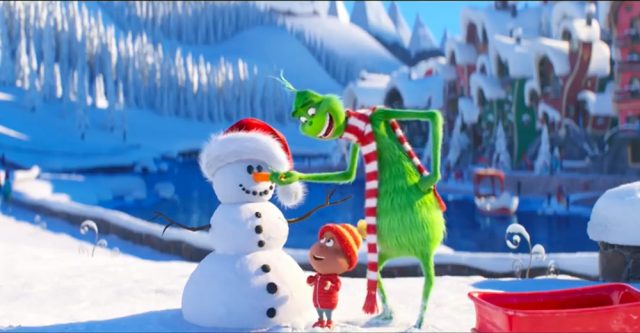
There’s only so much you can make of a movie that’s this bored with its own existence. Misplaced enthusiasm, which the live-action adaptation of How the Grinch Stole Christmas still achieved even at its worst, is better than no enthusiasm at all. I suppose if Universal was looking to make it harder to argue against the existence of that live-action movie with this new animated version, that’s fair enough, but is that really all that Illumination’s take on The Grinch is capable of? I guess there’s something to be said about the latest opportunity to shut your kids up for an hour-and-a-half, something that The Grinch can still offer with its aggressively middling final product, but even children will probably just feel cold with this version of the story. The Grinch may be more consistently alright than The Lorax as far as Illumination’s current Dr. Seuss adaptations go, but this also comes at the cost of making it significantly less interesting. We’ve seen Hollywood deliver bad takes on Dr. Seuss stories, but if The Grinch made any kind of impression on me at all, it was simply making me wonder if I actually prefer those bad takes over this aggressively mediocre take, since those bad takes were at least trying to engage my attention in some way.

